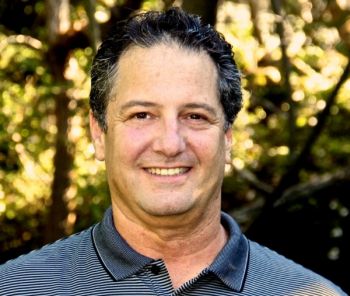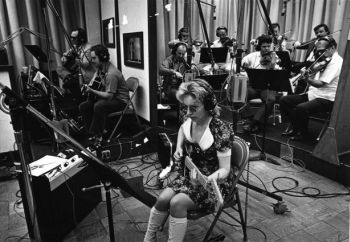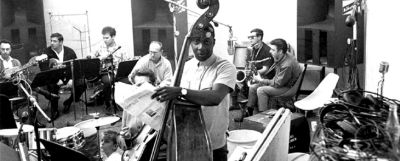By Pete Donnelly.
A group of long-revered musicians who performed countless hits in the 60s and 70s, the “Wrecking Crew” consisted of mostly unheard of session players who created a production line style, a kind of music-making machine. Record producers relied on their exceptional competence and speed to “crank out the hits,” including Frank Sinatra’s “Strangers in the Night,” Nancy Sinatra’s “These Boots are Made for Walking,” and The Beach Boys’ “Good Vibrations.” Meanwhile, the record-buying, radio-listening public had no idea who was behind these ever present sounds. The Monkees, The Byrds, Simon and Garfunkel, to name a few, all used various forms of the Wrecking Crew to create slick, professional sounding results, while record labels took full advantage. A golden era of pop ensued, and California became one of pop music’s greatest exporters.
Inevitably there was a monumental shift. The rise of “singer-songwriters” and self-contained bands brought to an end the production styles that had dominated pop charts for nearly two decades. The session musicians, many having achieved success beyond their wildest expectations, had to reinvent themselves. The work mostly dissipated and left a very unique population essentially unknown for the work they’ve done. Among musicians and aficionados there is the idolatry, the fandom, that’s often reserved for superstars. To the rest of the public, however, these musical masters remain un-credited and nearly anonymous.
Directed by Denny Tedesco (son of famed, late Wrecking Crew guitarist Tommy Tedesco), the documentary brings together a group of key players to reconnect and share memories. Decades in the making and finally in theaters (it was completed in 2008), it’s a heartfelt and jovial affair as they relive their past and recount the details. The mystery surrounding the name “The Wrecking Crew,” however, remains. There’s never a certainty of its origin, only stories and recollections. That’s just what this film is – the story of a sound, and the people whose hands created it. Through it all the session musician’s paradox becomes apparent. Timeless success is left to the owners, not the builders.
Thanks for taking time to talk with me today. Most people are completely unaware of what it takes to make records that we love. I used to comb album sleeves for clues about how they were made; now every last detail is put in print. Did you have a sense of how being behind the scenes affected your dad at the time? I imagine he was thrilled to be working as much as he was, but hearing hit after hit….
 Well, you’re right about one thing: he was thrilled to be working as a musician getting paid. He had no idea, even when they were in the middle of it, what they had done. ‘Cause they weren’t recording hits, they were making recordings. Sometimes they didn’t know what they were on. They just laid down the tracks.
Well, you’re right about one thing: he was thrilled to be working as a musician getting paid. He had no idea, even when they were in the middle of it, what they had done. ‘Cause they weren’t recording hits, they were making recordings. Sometimes they didn’t know what they were on. They just laid down the tracks.
From the inside, it’s hard to see what’s happening.
If you’re a band it’s one thing, rehearsing the song for days, but imagine him going in, “Oh, we’re gonna do two takes, three takes on that song. OK, move on. Alright, now we got that one down let’s go to the next one.” He has no idea what he just played. There’s no lyric.
It’s like cramming. You’ve got to get it in your brain and move on.
Yeah, you’re not hearing a mix, you’re not soaking it in. They didn’t have time to soak anything in. If you’re a mixer you’ll spend hours listening, but those guys moved on to the next gig.
All the Wrecking Crew players seem so confident. In your interviews with any of them did you see them having any insecurity in the anonymity?
No.
They were just in the moment.
Yeah, it always comes up. Were they acknowledged as stars? But it never felt like that. Watching my dad, he was a star among those musicians. And the musicians were among each other; they had such huge reputations, and the artists looked at them as the stars. When my father and Hal [Blaine] and Joe Osborn were in the recording studio, the artists would come in the studio and go, “Oh, thank god it’s them!” ‘Cause they know they’ve got something special there. People really looked up to them.
They were the stars to the stars.
People always ask, “Why didn’t they create their own band if they were so good?” As my father said, “We made hundreds of hits, but we made thousands of bombs.”
A lot of the Wrecking Crew have jazz backgrounds, but they’re playing mostly rock music. Did you get a sense that they were aware of the innovation, aware that they were creating a new sound in pop culture?
Yes and no. There’s a scene in the movie when I asked the guys, where do you come up with this stuff? Earl Palmer brings his stuff from New Orleans. Once Leon [Russell] was struggling on a date and Glen [Campbell] says, “Play that same ‘ol shit you play in Tulsa, OK. That’s what they want. They want Leon.” So they’re mixing genres.
That’s what’s so cool about this. These guys are session men, but their personalities are what are desirable from producers. And they know how to build the music.
 Mark Schulman, a younger drummer, played with Pink and a bunch of people. He said, “You could hate everything that Earl and Hal Blaine ever did. But there is no way you can say you aren’t influenced by them, because whoever taught you was listening to them.” Earl and Hal were doing things that hadn’t been done. Those fills, those shuffles. These things are passed down.
Mark Schulman, a younger drummer, played with Pink and a bunch of people. He said, “You could hate everything that Earl and Hal Blaine ever did. But there is no way you can say you aren’t influenced by them, because whoever taught you was listening to them.” Earl and Hal were doing things that hadn’t been done. Those fills, those shuffles. These things are passed down.
It’s ironic that these guys, all coming from a background in big band and pop and jazz, create fear in exactly that music’s generation: the concept of the Wrecking Crew.
Yeah, you’re right. Here’s the thing with the “Wrecking Crew,” the name. They said they’re gonna wreck the business playing this rock and roll. But my dad and Leon, and these guys, well, they would take the jobs maybe the older guys didn’t want to do. They were scab dates or whatever. Demos were illegal. You weren’t supposed to do them; you were supposed to get paid a certain rate. Demo rates were 15 for one, 25 for two. Older guys were saying, “I ain’t gonna do that!” But these other guys, they’ve got nothing else going.
They didn’t set out to do that, to take over – they were just taking gigs.
No, no. And we all do it. We’re all trying to figure out how to get that gig.
I love the Beach Boys, I love Dennis Wilson and his drumming even though it’s limited. Do think the players in the Wrecking Crew had any reverence for the simplicity of the bands they were replacing? The “dumbing down” concept.
Well, my father would always say, “There’s music and there’s the music business.” Sometimes they would mix. You might come to a date and think it’s silly and want to play something sophisticated, but is that what the producer wants? Whether it’s dumbing down or not, “You have to play until that producer is happy – and smiling.” My father said he just played for smiles. Snuff Garrett once said, “I don’t care what Tommy thinks. I didn’t make ‘Gypsies Tramps…’ for Cher to listen to.” Frank Sinatra didn’t like “Strangers in the Night.” He did it because Jimmy Bowen wanted it.
How often have artists had hits with something that they didn’t want to have to play, something they didn’t respect? Like the case of Frank getting his first number one with something he did off the cuff with Nancy [Sinatra], just messing around.
Can you imagine having a hit with something you hated? For years, having to play it.
You wonder what Ray Davies thinks about having to play “You Really Got Me” every night. Lots of musicians are cynical about it, but on the other hand we’d kill to have a hit.
I think artists go back and forth. I asked that to Bill Medley [Righteous Brothers]. Does it ever get old singing a song for 40 years? And he said no. “When I get on stage I’m not 72, I’m 25 again. I leave the old bones in the dressing room.”
There’s evidence in the Wrecking Crew recordings that there’s a collaborative looser sound.
Here in California studios there was definitely a looser feel than in the NY studios. Sometimes stuff would happen between songs. Someone might be doing a guitar riff messing around and a producer would say, let’s use that.
That brings me to something; Nancy said her dad’s best advice was to own her own music. Did the session players ever get writing credit for the ideas they came up with?
No. Very seldom. But here’s the thing. Like my dad said, “I’ve made lots of hits but even more bombs, and I don’t give back the $25. I always have to do my best. I’m not gonna hold back my creativity.” Carol [Kaye], Hal, all those things they’re playing. That’s all part of making the song better. You’re there as a professional.
Musicians debate this all the time. What about Andy Summers, of The Police, not getting any credit for his guitar riff on “Every Breath You Take?” The one that’s been sampled in Puff Daddy’s remake. It’s made Sting fortunes because he has full writing credit and Andy has none.
That’s different. That’s a band there. I understand what you’re saying. Look what’s going on now: the Marvin Gaye thing with Robin Thicke.
I want to ask you about Carol. She’s had some disparaging comments about the film. It’s understandable that people with long histories may have some issues, but did you feel any tension during the making of the movie?
 At the round table they all came together lovingly. It wasn’t until later that there was a falling out. I was like a kid with divorced parents. Then it just got to point where it just doesn’t make sense. You’ve seen the film; she’s brilliant in it. There’s nothing wrong with the film and her. Unfortunately, her memory may be a little more tweaked. I feel bad, since everything in the film, everything about her is all true. Have you ever talked to her, met her?
At the round table they all came together lovingly. It wasn’t until later that there was a falling out. I was like a kid with divorced parents. Then it just got to point where it just doesn’t make sense. You’ve seen the film; she’s brilliant in it. There’s nothing wrong with the film and her. Unfortunately, her memory may be a little more tweaked. I feel bad, since everything in the film, everything about her is all true. Have you ever talked to her, met her?
I haven’t, but I hear she’s available for lessons.
Well, don’t tell her you know me. Or that you’re a rock and roll musician. (Laughs)
Was there ever an awareness that the session man gig could come to an end?
There were a couple things going on at the same time. Technology changed, which was huge thing. But in the early 60’s a lot of these guys are there because labels aren’t trusting bands to get in the studio and knock out songs in three hours, on budget.
Back then it was mostly live; all the musicians together. Now you don’t need as many musicians because you can just layer instruments one after the next.
Exactly. Then you got bands coming up like Zeppelin. They don’t need these guys. CSN all those bands doing their own thing. So there was a shift and a new sound.
Did your dad ever talk about sessions when he was home?
I never saw him with a guitar when he was home. Not until later when he was playing jazz, for himself. People assume it was a hootenanny at home, but not at all. After 12 hours he did not want to pull his guitar out.
But I just wondered if there were particular stories that you heard over and over again. Like most of our dads have.
Years later, I’d hear them from other session players. And that’s what I wanted for this film. The stories they’re telling are great.
Musician/songwriter Pete Donnelly is a founding member of The Figgs, an honorary member of NRBQ, and has worked with Shelby Lynne, Soul Asylum, and Graham Parker, among others.


Great questions and very nicely written, Pete! I’m looking forward to seeing the film 🙂